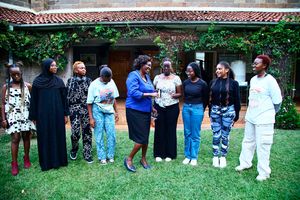Court jails Zuma for contempt

Former South African president Jacob Zuma.
Former South African president Jacob Zuma has been found guilty of contempt by the apex Constitutional Court and sentenced to 15 months in jail.
In a split decision, the Constitutional Court's majority found Zuma guilty of failing to obey its order of January this year that he attend to Deputy Chief Justice Raymond Zondo's state capture inquiry for questioning.
The majority decision by seven Justices, with two Justices dissenting, said there was no other option but to sentence Zuma to a term behind bars. The ex-President recently said he would rather go to jail than obey the court.
Zuma, 79, was given 5 days to present himself for incarceration, failure to which he would be arrested by police.
The Constitutional Court said Zuma's conduct was recalcitrant, egregious and smacking of 'malice', giving the court no choice but to deprive Zuma of his freedom.
The judges who dissented the decision held that while Zuma was no doubt guilty of contempt, without legal precedent and in violation of standard procedures normally undertaken in circumstances where civil contempt might arise to a criminal matter, a jail term was not in line with the Constitution.
Zuma's spokesman, Mzwanele Manyi, said the judgment was a "sad day" for South Africa.
He emphasised that at least two judges found that jailing the former Head of State would be unconstitutional and that the order, which is not appealable, represents a "constitutional crisis".
He added that a full response would follow after the judgment had been studied in detail.

Former South African president Jacob Zuma greets supporters in the gallery of the High Court in Pietermaritzburg, South Africa on May 17, 2021.
Watershed moment
Legal analysts said it was a watershed moment in South African jurisprudence and for the Constitutional Court as guardian of the constitution.
The majority decision was harsh in its assessment of Zuma, saying there was no doubt that he had willfully refused to obey a judicial order, was undermining the authority of the court and that it was a risk to the rule of law if Zuma was allowed to act as he had with impunity.
Detailing the steps which had led to its landmark determination, the Constitutional Court majority, represented by Justice Sisi Khampepe who wrote the majority judgment, was thorough.
The Acting Chief Justice covered the same terrain as dissenting Justices Theron and Jaftha, who agreed that Zuma was guilty of contempt, but she also explored the fact that Zuma was "no ordinary person", but rather, was a former president of the country and was capable through public statements of contributing further to damaging the judiciary and the rule of law.
It was necessary, therefore, for the vindication of the court and protection of the rule of law that Zuma be sentenced to jail, she concluded.
Social media commentary
Social media in South Africa lit up immediately after the judgment, with pro-Zuma elements warning that "all hell will now break lose", while many others hailed the decision in light of the vast looting of state funds which took place during his nine-year rule that ended in early 2018.
Prior to the judgment, it was widely expected in judicial and political circles that Zuma would likely be jailed, but it is also known that there was extensive dispute, as expressed by the minority justices, about the utility of a jail time sentence rather than a coercive suspended sentence designed to force him to testify.
But the Concourt majority of judges determined there was no point of a coercive suspended sentence since Zuma himself had not only declined to engage with the court on the issue, having been invited to say why he should not go to jail, which he refused to do, but had also repeatedly said he would rather go to jail than obey the court's order and appear before Zondo's commission.
Justice Khampepe said the court had "gone out if its way" to ensure that Zuma suffered no judicial unfairness, hence the invitation to him to make representations to it regarding sentencing, but that he had refused, had been "recalcitrant" and had actively attempted to undermine the rule of law and the authority of the Constitutional Court.
Analysts pointed out that all the Justices were in agreement on the fundamentals of the case, including Zuma's guilt, the only issue being what was the best and most appropriate sentence.
Zuma supporters gather
Outside Zuma's rural homestead at Nkandla in KwaZulu-Natal province, a small contingent of supposedly former members of the ruling African National Congress (ANC) party's armed wing were present, saying "no-one will come and take Jacob Zuma to prison".
Other supporters of Zuma were gathering at the homestead, while it is understood that separate protests and actions by pro-Zuma elements were being planned.
Zuma had been planning to attend the state funeral of former Zambian president Kenneth Kaunda in Zambia, but now that may not happen.
Despite Zuma's spokesman and other supporters making much of the split decision, legal experts pointed out that such judgments were fairly common and the split had no effect on the majority decision, which stood and which meant that Zuma was now headed to jail.
There was no immediate indication of Zuma's whereabouts, with some supporters saying he had "gone back underground, just like in the apartheid days", but that he had "no fear" of going to jail.
On social media, one of Zuma's daughters said she had spoken to her father and that he was in "high spirits" and had "no fear".





